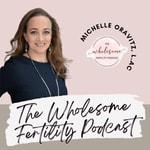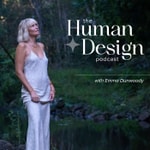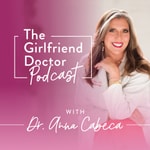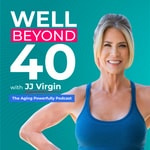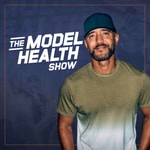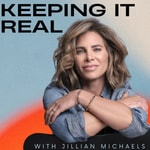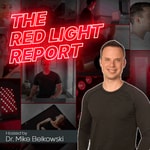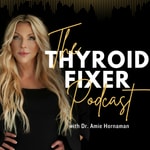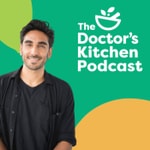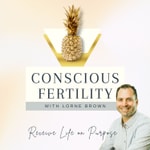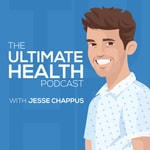On today’s episode of The Wholesome Fertility Podcast, Naomi shares her personal fertility journey and how she discovered the mind-body link in fertility. She emphasizes the importance of mindset and emotional well-being in the fertility process. We discuss the concept of toxic positivity and the need to embrace and process uncomfortable emotions. Naomi highlights the science-backed positive psychology techniques that can reduce stress and improve fertility success rates. Mind-body techniques can improve mental health, relationships, and overall quality of life. Naomi emphasizes the importance of feeling good and finding joy during the fertility journey. She shares the power of hypnotherapy and emotional freedom technique (EFT) in shifting beliefs and accessing the subconscious mind.
Takeaways - The mind-body link plays a crucial role in fertility, and mindset and emotional well-being are important factors to consider.
- Toxic positivity can be harmful, and it is essential to embrace and process uncomfortable emotions.
- Science-backed positive psychology techniques, such as mindfulness and hypnosis, can reduce stress and improve fertility success rates.
- Mind-body techniques not only improve fertility outcomes but also enhance mental health, relationships, and overall quality of life. Managing stress and finding joy during the fertility journey can improve overall well-being and increase pregnancy success rates.
- Hypnotherapy and emotional freedom technique (EFT) can be powerful tools in shifting beliefs and accessing the subconscious mind.
- Challenging medical assumptions and seeking second opinions can provide new perspectives and options for fertility treatment.
- Feeling good and having positive emotions can have a significant impact on fertility and overall health.
- The Embrace Fertility Method offers a comprehensive approach to fertility support, incorporating various techniques and personalized guidance.
Guest Bio: Naomi Woolfson, of Embrace Fertility, is a trauma trained therapist specialising in supporting women emotionally and energetically to conceive, carry and birth the babies they long to hold. Alongside supporting clients globally in one to one therapy and coaching sessions Naomi runs an online 12 week mind-body group programme guiding women through the 5 steps of her unique Embrace Fertility Method; Comfort, Coping, Connection, Clearing and finally Creating. Naomi hosts the Embrace Fertility podcast offering emotional support and sharing mind-body techniques to help you feel calm and confident and ultimately find yourself again while waiting for your baby. Personally Naomi and her partner went through almost 4 years of infertility, IUI’s, IVF, anxiety, surgery and a miscarriage before conceiving both of their children naturally. Visit www.embracefertility.co.uk for instant access to Thrive - A deep dive into the science backed mind-body techniques to emotionally and energetically thrive while trying to conceive. 3 x 30 min videos. Naomi also offers specialist pregnancy support and runs the hypnobirthing course Embrace Bump to Baby of which the first week is free. Instagram @embracefertility
https://www.youtube.com/@embracefertility https://www.linkedin.com/in/naomi-woolfson/ For more information about Michelle, visit:
www.michelleoravitz.com Check out Michelle’s latest book here:
https://www.michelleoravitz.com/thewayoffertility The Wholesome FertilityFacebook group is where you can find free resources and support:
https://www.facebook.com/groups/2149554308396504/ Instagram: @thewholesomelotusfertility Facebook:
https://www.facebook.com/thewholesomelotus/ Transcript: Michelle (00:00) Welcome to the podcast, Naomi. I'm so excited to have you on today. Naomi (00:04) Thank you for having me. Michelle (00:06) Yes. So I would actually, first of all, love if you could tell your story because I know you've been through your own fertility journey. And I also, of course, I'm going to be very excited to talk to you today because as you know, this is like I nerd out on like the mind, body and just like how the mind works. And so I'm really excited to have you on. And then I just wanted for you to introduce yourself and give us your background. Naomi (00:34) Yeah, so I went through infertility myself. We ended up having four rounds of fertility treatment. I was actually diagnosed with endometriosis as a teenager and told that I would probably need IVF to have children. But got married and I was like, nope, that's not gonna be me. I could be one of those women with endometriosis that just gets pregnant and it's fine. And I was very into the law of attraction and the secret and... manifesting and set those intentions. I just set the intention. I was like, we're ready for a baby now. Come on. And then nothing happened. And then, you know, I was manifesting, I was doing my vision boards, my affirmations. And instead of getting a baby, I got ovarian cysts and ended up needing to have surgery. And they were like, you really, you know, really push you like into treatment now, like your endometriosis is getting worse, like every month you're not getting pregnant. endometriosis is spreading. So I had a laparoscopy, they removed the cysts, did some laser action on the endometriosis, did treatment, didn't work, did more treatment, didn't work. And I was getting more and more anxious, more and more depressed. I was like, this isn't how it's supposed to be. And was feeling awful. And then found out about the mind body link and learned that it wasn't the fact I wasn't getting pregnant. Michelle (01:34) Hehehe Naomi (01:57) that was causing the anxiety and the panic attacks. It was my thoughts about the fact I wasn't getting pregnant. And this blew my mind because I was so interested in meditation and the law of attraction and all these things already, but I'd never really put that together. I was like, all right, so that means I don't have to wait till I get pregnant to then be okay. And they're like, yep, that's it. And I was like, no, don't believe that. That, just no. And then as I was practicing mindfulness, like really getting in touch with what was going on and the beliefs I had about pregnancy, the beliefs I had about my body, came to this place of acceptance and actually felt happier then than I ever had in the past, even though I was yet to be pregnant. And then actually our fourth round of fertility treatment was successful and I got pregnant, but then I miscarried. Michelle (02:47) Mm. Naomi (02:54) And instead of going back into depression and anxiety, I actually felt hopeful for the future and then conceived naturally three months later after the miscarriage and then have my daughter naturally two years later. And so throughout all of this decided that I had to share these techniques. So I actually left my career in design while I was going through IVF, retrained as a hypnotherapist and was actually working and supporting women in this field like two years into my journey and then it was like another two years before I got pregnant myself. Michelle (03:29) That's such an amazing story. And I love it for so many different reasons. And again, I apologize for the background noise if anybody's hearing that. but it's, it's incredible in so many ways. You know, the book I thought about when you were talking about that, have you ever read Man's Search for Meeting by Victor Frankel? And that blew my mind because I think that we are so conditioned and I think it is kind of like second nature to say, okay, well, Naomi (03:45) Mm. Yeah. Michelle (03:55) We can't possibly feel good if we're going through something that is difficult. That book specifically was like the most extreme of like what you could possibly go through. He was, you know, in a concentration camp. I mean, so you can't get worse than that. And the way he discussed about how we have one freedom that's left over, and that's the freedom of how we choose to view things. And I think that is so profound because I really do feel like people think that they have no choice. So how did you finally, not just realize this, but also because you could realize it and you can hear it. And then sometimes you can fight that. So how did you like surrender to that and say, okay, you know, there's maybe, maybe it is how I'm looking at it. Cause that's a hard thing to go through. Naomi (04:50) Yeah, and it was very much that I did fight it because my friend actually bought me that book like while we were going through Yeah, and I was like Why aren't you giving me this like well, that's depressing literally just put it on my shelf and I was like I'm too depressed to read something because it was so triggering and was and I was like I you know, I can't read that and it wasn't until like years later that like picked off the shelf and I was like this is what Michelle (04:55) This book that I just mentioned? wow. Naomi (05:18) that's why you wanted me to read it. But at the time I just wasn't receptive to that. But also with when people first started saying to me, it's like, you can be happy even without a baby. And all I could hear in that was them telling me to stop wanting a baby. And I was like, I've wanted a baby since I was like two and a half and my mum had my younger brother. I can't switch off me wanting to be a mum. who I'm supposed to be, that's what I'm supposed to be. I really believed that. I was like, I can't turn that off. And then it was as I got deeper into it, they're like saying, they're not saying turn that off. They're saying stop desperately wanting it so much and believing that that's the thing that's suddenly gonna make everything okay. Because it's also they now I'm supporting women, they get that positive pregnancy test and they don't go, amazing. Well, I feel amazing now. Michelle (05:47) Yeah. Naomi (06:11) just a whole new set of worries come in, a whole new set of anxiety, because then they're like, well, now I need to get to the eight week scan, now I need to get to the 12 week scan, so here's a 20 week scan. Whereas if you can learn to come to that place, and I think for me, it was a combination of mindfulness meditation, journaling, emotional freedom technique, really exploring what my thoughts were doing to me. Like my thoughts were literally making me physically sick. Michelle (06:17) Mm -hmm. Mm -hmm. Naomi (06:40) having panic attacks, I wasn't sleeping, my digestion was all over the place, I had IBS and it was because of my my thinking I was making myself ill and it was only when I really sort of started to accept that that I could start to change whereas to start with was like no I just need to get pregnant as quickly as possible that will fix the anxiety I won't have panic attacks anymore once I'm pregnant, it'll be fine but obviously then it was months and months and months more of trying to conceive and it's living in that discomfort where you don't need to. So that's what I talk about a lot. It's like you don't have to live in this waiting zone of limbo. You can be happy now, you can be joyous now and still really, really, really want a baby and still be doing all the things you need to help you get pregnant, but not have that desperation and that like, if this doesn't happen this month, the world will end. Michelle (07:37) Yeah. I mean, what you're saying right now is so profound and true and important because I think that part of it is just how we've been conditioned just as a people. I think everywhere, modern day times, everything's a quick fix. And really the outside is revered as like really the material world is revered as like the end all be all where in ancient times they've always pointed us internally. Go within, go within, go within. The answer is within. And now you tell somebody that they're like, what do you mean? Like within, I want to get, let's be realistic. Okay. You know, so what's, but what is reality ultimately, right? But a reflection of our internal world, but we're trying to fix the reflection. I mean, this is really how I see it. There is a reflection. We know this also with quantum physics. There is something to that, that Naomi (08:15) Thanks. Michelle (08:35) everything that happens outside of us is really reflection. And that's not, I just want to say this, not to blame anybody. This isn't saying that it's your fault or anything like that, or that you can control everything. Not at all, but that internal world does have an impact really on your life. And I think that it's often overlooked, it's often ignored, and we get so hyper -focused on really what I would call the reflection rather than going. within and starting from within where that in tandem is really beneficial. So not that the outside means nothing and it's just an illusion, but it is really important to address the inside. And I think that you're saying that you can actually feel happy and at peace while you're going through something difficult would be very hard to believe for a lot of people. And this is what I love is that you have been there. It's not like you're just saying, you know, hypothetically, it would be really like easy for you. No, you know, you actually went through this and discovered it on your own journey. Naomi (09:44) And I think that's so interesting is like, you know, now I have my two kids, they're both ginger, they're both born in June. It's like, it literally, the way it turned out, even though it took more years to happen, what I wanted has now, now exists. I wanted ginger babies, I wanted them to have June birthdays so we could have a giant bouncy castle, you know, garden birthday party. These things all happened, but now there are other things in my life. that test me in the same way. And it's remembering, it's like going, you know, we'll feel happy and relaxed, like when we get to this point or, you know, summer holidays are a few weeks by a lot, we're just going to just get through these few weeks. And again, it's like we're rushing through life instead of being like, well, where's the joy in today? How do I want to be today? And instead of just being like, here's my to -do list, I'm going to plod through and cross through these things off. And it's like, well, no, every day. Michelle (10:21) Hehe. Mm -hmm. Naomi (10:42) can be that gift and can be that, how do I wanna show up? And so it's like, you learn these techniques and it's not just to get you pregnant and then you're like, brilliant, pregnant now, can throw all this in the bin and move on. It's like, it's been constantly helpful throughout pregnancy, throughout labor, while the kids were tiny, like now they're starting to get bigger, you know, it's more dealing with the emotional storms that they're. Michelle (10:56) Mm -hmm. Naomi (11:09) going through rather than physical things like when they were younger. And so it's having these tools and techniques to fall back on each time and being like, they're my rock, like they're my foundation of how I do life. And so then if I don't practice them and kind of fall off the wagon, and then I'll really notice that. And it'll be like, you know, if you haven't brushed your teeth, you can really feel it and you're like, my teeth don't feel quite right. I feel the same now. It's like, if I don't meditate or don't journal, Michelle (11:24) in. Yeah. Naomi (11:38) or I walked in the woods, I'm like, just my mind feels a bit icky, a bit like, I'm not, what's wrong? I haven't been for a walk. I haven't flossed my teeth. You know, it's that same, like, sort of, just something feels a bit off. Michelle (11:43) Young. Yeah. And I think that, we almost don't realize like how off we feel until we start to do things that are good for us. And then we're like, this feels really good. And I can't really go back because then that doesn't feel right. And I think that that's what it is. I feel like meditation is like mental hygiene. It's like Naomi (12:09) Yeah. Yeah. And it's so often people are, they get really busy. And so you're like, I'll drop that. And I love that quote that it's like, if you're, you know, if you're, if you're busy, you should meditate for an hour a day. If you're really busy, you should meditate for two. And I just love that because it's so true when we get busy, we're like, we drop the things that are really good for us and can allow us to traverse the busyness and the things in life. in a much more elegant way. Michelle (12:38) Yes, totally. It's almost like when you're taking, I always look at the branches and the flowers and everything really comes from the root. And if you're ignoring the root where everything comes from and really not feeding the plant itself and nourishing, how is it supposed to sprout? How is it supposed to flower? You can't expect it to do that unless you're taking care of it. And I think that we need to, we must. care of ourselves, like in every way. If we're expecting things from our body, if we want longevity, I mean, that's really the core of vitality. For sure. And then let's talk about, okay, so we hear, and this is a pretty common thing in the fertility world, you know, this idea of, obviously there's science -backed positive psychology, which we know about, and then there's something called toxic positivity, which isn't as helpful. And then what happens is, which I find to be a shame, is that sometimes people get so like turned off. by that, that they're not even willing to look at the science which actually can in fact help. Naomi (13:47) Yeah, definitely. I think because there's this whole kind of culture of, if you just relax, it will happen. If you just stop thinking about it, if you just like the best yet, it's like, if you just stop trying, then you'll get pregnant. And I always used to say, it's like, this isn't going to be an immaculate conception. Like if we stopped trying, there will be no baby because we're not trying. And what people are trying to communicate is stop being so desperate. Stop like desperately Michelle (14:07) Right, right. Naomi (14:16) grasping for what you want, but if you tell someone who really wants something to stop wanting it, or you tell someone who's really stressed to stop being stressed, or you tell someone who's really worried to stop worrying, all you're doing is adding another worry, another stress, onto that list because now they're like, hang on, you're basically now saying that's my fault that I'm stressed, that I want it too much. And saying to a woman who's like, I was so Michelle (14:32) Mm -hmm. Right. Naomi (14:44) sure I wanted to be a mum and I was so ready and I couldn't understand how my husband and I when we were newly married We had like our home, like we were all ready to go and it wasn't happening for us. And I couldn't understand why like babies were being sent to other couples who, or you know, single men who weren't ready and didn't actually even want a baby. That was so confusing to me. And so then people saying to me, it's like, stop wanting it so much, like just stay positive and stick a smile on. And when I started researching into more, it's actually really, it can be really negative for you. to try and remain positive all the time, because we're not designed to stay positive all the time. We're actually hardwired to notice the negative more than the positive to keep us safe. we're literally like primed like the whole time checking. And then if you take that, and it's also where like, we shouldn't really call any emotions negative. If we feel emotions that feel uncomfortable in the body that we label as negative. we like shove them down and we're like, I don't want to feel like I don't want to feel. And so we try and numb out, scroll on our phones, like, you know, drinking, partaking in habits, like watching TV that we don't really want to watch, like all these things or comfort eating, things to kind of numb out these feelings and we shove them down. And all that happens is they build and they build and they build. At some point they'll come out. For me, it's panic attacks. For other people, it can be like a burst of rage or it can be just like bursting into tears in a meeting. because there hasn't been an outlet to feel, experience, embrace those emotions that you're feeling. And once you start doing that, I can feel petrifying because so many of us, since we were like small children, you fall over, you cry, and you're told, you're okay. Don't cry. Stop crying. Here, lolly or here, have a toy. Here, be distracted. Swallow that pain down. No, we don't want to see it. That's not welcome here. And so when we start, Michelle (16:30) Right. Naomi (16:41) And a lot of the time the emotions we have, yeah, you're like, it's not okay for me. You know, I shouldn't cry, especially if it's like, if you're like really probably ugly cry like, you know, and you're like, like. Michelle (16:42) It's that judgment. You feel that judgment. I between. I only have an ugly cry. I almost wish I was one of those people that just like has a straight face and a beautiful tear. Nope. Naomi (16:56) I guess you see my... little tear. It's so raw and it's so animal. We're not used to allowing ourselves to really express ourselves in that way. And this is why I love emotional freedom technique, that you're literally using a technique that says, I embrace and accept all of this stuff. It's uncomfortable and I don't want it, but it's part of me, therefore I accept it. And as soon as we accept something, the resistance to it lessens. And then we're like, maybe that isn't as... Michelle (17:24) Yeah. Naomi (17:31) awful as I thought it was going to be and you can just sit with things a little bit. I've gone from a complete to a complete, but yes, so with toxic positivity, you're kind of basically going like, I'm fine. Everything is fine. Even, literally even women who've like had a miscarriage haven't told anyone, still gone into work, done these massive presentations and they're like. Michelle (17:33) Yeah. Yeah, keep that smile on your face. Naomi (17:54) and then they wonder where they get home that night, go completely batshit crazy out their partner and have a full down meltdown and it's like it had to come out at some point and you've let it build and build and build instead of giving yourself the time and space to go I'm gonna sit and I'm gonna feel this now. Michelle (18:14) Yeah, it's so important. And I've really like, I love the book, The Untethered Soul. He talks a lot about leaning into those uncomfortable emotions, because our knee jerk reaction is to stop anything that doesn't feel comfortable or good. And that is where the blocks happen. Because what we're doing is we're not actually removing it. We're actually keeping it in place by like not allowing it to process and to, I feel like it's like emotions. You have to almost digest it so that it can go through and be processed because it's important to do that. But I love that book because he describes it in such a clear and easy to understand way on how you lean into it. Basically, you just sit with Naomi (18:48) Yes. Michelle (19:07) So it's not this internal denial of emotions. what's the science -backed positive psychology that you were referring to? Naomi (19:17) Yeah, so a lot of my work, so my training is in cognitive hypnotherapy and everything, the training I'm in was like look at those studies, look at, you know, what's the evidence behind this? So we can obviously experience these techniques ourselves, see what many clients and seen the shift, seen the transformations that happen when they use these techniques and we do this work. but I love going to the studies as well to really back up and go, because so many people are still like, that's really woo woo, that's really like out there. And I'm like, we've got studies. So some of them, to share through the negative ones to start with, are that women undergoing infertility treatment experience the same level of stress, anxiety and depression as women who have cancer, HIV or heart disease. Michelle (19:51) Mm -hmm. love it. Naomi (20:09) So this is a real serious thing. This isn't like, I'm a little bit stressed because I can't have a baby. This is like massive, huge stress caused by the fertility treatment. So however stressed you were in life before this point, the treatment itself is adding to it. So in the post -traumatic stress disorder can develop in a third of women after miscarriage or eptopic pregnancy. Michelle (20:14) Mm -hmm. Naomi (20:34) and women who've experienced at least one unsuccessful IVF cycle and had depressive symptoms before continuing treatment experience the lowest success rate, which is probably one of the most depressing statistics I've ever had. You've had treatment to help you have a baby, it hasn't worked, and then if you start getting depressed about it, the next treatment has a lower chance of success. It's just such a depressing statistic. Michelle (20:47) Mm -hmm. Naomi (21:03) So of every statistic, I'm like, well, let's find the flip side of that. So that's a percentage of people. This study is saying this. Of every study, I like to find the flip side that backs up what that's saying, but with the positive or the opposite information. So that's where we come to things like using mindfulness is effective in reducing anxiety in women going through infertility by 76%. Michelle (21:06) Mm -hmm. Naomi (21:32) and reducing depression by 46%. Using hypnosis during embryo transfer can significantly improve IVF success rates and implantation rates. Depression, anxiety and stress among couples using emotional freedom technique was significantly less than those not using it. And the studies that show by practicing mind body techniques, you can actually double your chances of pregnancy success. And they've shown that women going through the mind body studies at the IVF Boston Clinic, we're just having a better success rate within the six months that followed of them practicing these techniques. So this is kind of a slow burn. These aren't like, meditate for a day. You're going to get pregnant. This is more like, this is a lifestyle choice that I'm then implementing. I'm making this part of my, my life for the next few months. And then you're going to be improving your Michelle (22:17) Mm -hmm. Mm -hmm. Naomi (22:29) chances and I've done a little, let me show you that. So these are the things that mind body techniques decrease are anxiety, depression, stress, anger, worry, jealousy and fear. And it improves quality of life, your relationship with others and yourself, resilience, hope and pregnancy success rates. So it's very much like the pregnancy success rates always say is like the cherry on the top. All the other things are like, that's what we want to be focused on. We're getting you happy. managing stress, getting you to feel really good. And then a pregnancy is like, yay, that's the extra bit, but we're doing this for you and your wellbeing. It's like getting you feeling good, improving your quality of life during this time allows you to then be making decisions from a place of confidence, calm confidence, rather than a place of fear. Like I felt like I kept going into treatment because I was being told that was the only option for me, that that was the best option for me. And for the first... three rounds of treatment I did, I was so stressed, I hated it. And it was just so, so hard. And then I started practicing these techniques. So the fourth round of treatment I did was a breeze and so, so different from the three before. Then I got pregnant naturally anyway. So it's like, but it's having these techniques that made what I was going through, it just felt completely different on that fourth round. Michelle (23:42) Mm -hmm. Yes. And also, I don't know if you've heard of the study about laughter therapy after transfers improves the chances of pregnancy mean, that's pretty wild, like that endorphins and laughter and being in this kind of state that's elevated could really impact that ability for it to stick. And then I suggest for people to do it really throughout the IVF, like just... Watch comedies. Don't watch anything too heavy. Lift your emotions I'm like a huge fan of Dr. Joe Dispenza's work and I've been going to and he talks a lot about the studies and really the two main things that they deduce from everything, from the techniques that he does, the two big things are your thoughts and your emotions. So it's not just your thoughts. This is kind of like the emotions are sort of like that magic ingredients that activates the thoughts. That's why some people have a hard time with just doing affirmations because when you're just thinking or saying the same thing over without any emotion tied, then it's not as effective. So having a heightened state of emotion is what really impacts a lot of what happens in our bodies and how our bodies respond. people really overcoming major, major diseases that they are told by the experts cannot be overcome because that is working through that material world versus the quantum, which is really where our minds, the worlds of our minds, that is the thing that we can access that we can't access through the material world. Yes, we could try to do things. We can... take things out and do the surgery and do all the physical things that we need that take a little longer and are more dense. It's a more dense approach, not to say that it shouldn't exist. But then there's the other non -dense approach, which is the mind and coming to that place where you're able to shift things in a different level. Just like you said with meditation, you want more time, meditate longer. That's because you're going to a place where you're able to, I believe, make magic and so elevating that emotion and now we know really with studies like the heart math, I'm sure you've looked into that, right? Heart math and how our hearts and brains have a coherence. Well, Chinese medicine has been saying that for thousands of years and then we know that the heart impacts the uterus. So having that heart and now we're seeing it in studies. I mean, all the things that you're listing are pretty much pointing in that direction, how we feel in our life, how we feel in our world. And I think the biggest thing that you said that was just so spot on is that you can actually feel good while going through these things. Like that is the biggest like, my God, because I think that a lot of people don't really realize it. This is why I want to repeat that again, because you can feel good. You could thrive. Naomi (27:02) Yeah. Michelle (27:05) while you're going through this journey. Naomi (27:08) I remember that like once I'm actually crying like tears of joy and still trying to conceive I kind of remember what happened it was something like really small thing like I think I was just sat in the park and the sun was saying and it was so beautiful and I just sat and I just had a little cry but of joy and I don't think I'd ever cried from from joy before and it kind of was like wow that this feels so powerful, I'm so overcome with positive emotion right now that I'm having this massive physical reaction to it. And I was just like, that's pretty special. That's pretty special that I'm now so open and I've managed to clear all of, because before I used to have this ongoing repetitive thought of like, what if you never get pregnant? What if the endometriosis just gets worse and then... you have to have a hysterectomy and then that's it. Like, you know, it's like the thoughts were just this, they're like churning, churning. I'd like to wake up in the morning and my thoughts would just, would just be like attacking me. And it was then when I learned it's like my thoughts aren't deliberately doing this to make me feel really ill. They're doing it because they're trying to protect me what my, my inner self is. So do quite a lot of parts work with hypnotherapy. So the part of me that was petrified that I never get to be a mom. So it was telling me all these thoughts and telling me like, Michelle (28:15) Mm -hmm. Naomi (28:33) Get on it, do more treatment, like do more acupuncture, do more herbs, do all the things, do it all today. You need to think. And then the part of me that was like, it's gonna be okay, like I can walk this path, I can do what I need to do to support myself. It's gonna be okay. And when I could get myself into this place, I could see things like the sunset and I could be touched by that instead of being so blocked off by the light, the fear and the worry and the just. Michelle (28:57) Mm -hmm. Naomi (29:03) what if never and everyone else has that and I'm getting left behind and how does that, how do I traverse that? And it's like just bringing yourself totally back into the present moment and being like, and sometimes that's so hard. Like meditation for me was almost impossible to start because I just sit there and my mind would be like, yay, you're really listening now. Let's give you everything. And like only just so much. Michelle (29:08) Mm -hmm. Yeah. All the fears. Naomi (29:29) yeah, all that stuff. So emotional freedom technique for me was amazing because I remember saying that intention. I think we were about a year into trying to conceive and I set the intention that what I wanted was a way to turn off my mind. I was like, I'm going to be able to turn off my mind. I just want to press a mute button and just have my thoughts be quiet. And meditation didn't work for me like that. Like so many people are like, we just learned to meditate. That just didn't happen. It just, my thoughts got louder. Whereas with EFT, because I had a process and a way to work through the thoughts. I remember the first time I had a kind of blank mind of just quietness and I was like... Michelle (30:02) Hmm. Ha ha. Naomi (30:09) too far away from what I was capable of at the time. Michelle (30:13) So that's interesting. That's actually really good information because I know a lot of people have a hard time with meditation. Although I do think you could get there through meditation, it is a little bit more torture. Like if you don't do other things. So I think that that's a really good thing for people to hear is maybe to look into emotional freedom technique as a sort of in -between to get you from point A to point Z. So you're able to really get in there and feel more peace while you're meditating. Naomi (30:27) Yeah. Yeah, to support the work you're doing alongside. Yeah. Michelle (30:44) quick question just for don't really know as much about hypnotherapy, like why is it so powerful? what are the things, because I know because I'm trained, but like the subconscious mind, talk about like the beliefs that are in there that are so like lodged into the makeup of our being that they almost take over our free will and talk about why it's so important to have those types of therapies to shift those really ingrained beliefs. Naomi (31:20) Yeah, so I think for me, like to set it with a story. So for me, because I've been diagnosed with endometriosis and that was due to incredibly painful periods, the beliefs I had that I just wasn't aware of were my body is broken. You know, I have endometriosis, therefore, like I had this, even though logically and on the surface I could say, I'm not gonna need treatment. You know, we're just gonna have our babies naturally. I think I was really holding that belief of like, you know, a doctor, person in authority had told, so, you know, like a man in his like fifties had told 19 year old me, you're probably gonna need IVF to have babies. Like, you know, buckle up, that's probably what's gonna happen. And I'd like taken that on as a belief. And so for me, it was working through, and I didn't trust my body because of the endometriosis and because of the pain I'd experienced, I could only link like, pregnancy and birth with a lot of pain because people had said to me, giving birth is like, you know, period pain, but like a thousand times worse. Whereas because I had period pain that had meant, you know, I'd nearly passed out from the pain that I'd nearly rang, you know, an ambulance to come and collect me because I collapsed on a walk. So in my head, I was like, that's period pain. Birth is worse than that? God. Whereas then now I've given birth twice. One birth was pain free. One birth was Michelle (32:22) Mm -hmm. Naomi (32:44) painful but only for 15 minutes because she came in such a rush and birthed herself, I was in labor for 40 minutes. I now know the people that said, you know, labor was like pain, but worse. One probably hadn't practiced hypnobirthing and weren't like prepared for what their body was going to do, but also probably had like little tiny cramps that were like, little thing, not like massive endometriosis cramps. So for me, it was unpicking all these beliefs of what, what Michelle (32:59) Mm -hmm. Yeah. Naomi (33:12) my body meant like what my fertility meant and they can be like yeah like you said like deep inside that we're not even aware of but they impact the way we think the decisions we make the behaviors we have and so for me like whenever it was my period i was so used to just taking painkillers pushing on through my cycle ended up flying from london to glasgow and back for a one -hour meeting on the first day of my cycle and i haven't made traces and we were trying to trying for a baby. So I was obviously massively disappointed that I wasn't pregnant, had horrific cramps, took a load of painkillers, got on this plane and I got home at, you know, like nine o 'clock at night that evening. And I was just like, what am I doing? Like I'm just pushing, pushing, pushing myself for my job. Like why on earth didn't I just say I can't fly up that week? Obviously, you know, I didn't feel in a position at the time to go, I'm probably going to be getting my period then. But it's like, I should have, you know, it's like now, if I was in that position, I would be like, I have endometriosis, that's not gonna, that's not gonna work for me. That's not, I can't, I can't basically. Physically, I'm not gonna be able to do that. It's gonna need to be shifted. Although saying that, I wouldn't say that now because now, now I don't have really painful periods because I've dealt with all the things with my period. So that's something to say as well. It's like, Michelle (34:06) Yeah. Naomi (34:35) I just accepted that I would always have incredibly painful periods. And then when I worked with an acupuncturist, when I worked through the beliefs I had about my body and about pain and about rest, I was then having pain -freeperiods. The point I would like get my period and I'd literally be like, whoa, what's that? because I had no cramps, I'd had no buildups. I literally be like shocked when I saw red, because I'd just be like, I wasn't, Michelle (34:39) Hmm. Mm -hmm. great. Naomi (35:02) Yeah, it was such a different experience. So we need to, if you can really get to inside, and this is the joy of hypnotherapy, that we can access the subconscious mind in a really safe way and be like, what's in here? What are the things that are not serving you? What are the beliefs that we can choose to let go of and choose to install new beliefs? So in the latest trauma training I've done over the last couple of years, I'm actually taking the beliefs you have, removing them and installing new beliefs. And that like absolutely fascinates me. And in the space of two weeks, clients being like, this is how I feel. This is what I believe. This is what I'd like to believe, but that's complete BS. Not a chance. I don't believe it. And then we do the work and by the end of the two weeks, and then they're kind of like, yep, I am like, yep, that's my new belief. That's new way of. thinking, feeling, experiencing the world literally in new thought pans that then changes their behaviors, changes the way they make decisions about, you know, not just their fertility, but their relationships, their work, their health, all these areas. And it seems so, it seems so simple to me because I'm in this work all the time, but obviously people are really like, my God, like this is huge. Like I don't, I used to believe this and I believe this. my God. And I'm like. Of course. And it's like, and they're like, it's massive. Like one client said it was Superman, like supercharged, these thoughts and like just like completely defeating Luke. Michelle (36:31) amazing. Naomi (36:41) Lex Luthor when she never thought that would be possible whatsoever and just changing that just being like God Michelle (36:46) Yeah, I love that. Because, you know, thoughts give power and then they can also take away power depending on the thought. And also when you talked about like an older man, an authority figure, you know, how you said your experience was with your doctor. Keep in mind when you're trained in hypnotherapy, they talk about that. They talk about one of the things that can hypnotize people. is because when you see somebody as this authority figure and you view them in this high regard, which we do a lot of times with behind their names or after their names, then we could give them our power and allow whatever they're saying to have absolute authority over us. And that could be in a sense, hypno session right there, Naomi (37:39) Yeah, and yeah, it's like you need to be, I think, love the work we do. We're not hypnotizing people, we're de -hypnotizing them. And we're bringing you back out of the trance state that you've been living in, like especially around birth. And we still set up society, society's just set up to basically tell us birth is to be feared, birth is painful, birth is all these things. That's not true. And so we can... Michelle (37:46) Yeah, my God, I love that. Yes. Yeah. Yeah. Naomi (38:06) de -hypnotize ourselves Michelle (38:08) I love how you put that because it is, it's kind of like waking up, becoming more conscious in our life, becoming more conscious of our power and what we really can do for ourselves. And I think that that's, that's the biggest thing. I really feel very passionate about it because I myself have had times where I felt completely powerless in my life and I believed a lot of things about myself and my body. And so I think that when you come out of that, you're like, everybody needs to know this. Like everybody needs to know, you know? And I think we have that in common. Naomi (38:43) I think that's what's so exciting because I work with so many women that are like, my doctor's told me this, as if it's a fact. And I'm like, have you got a second opinion? And they're just like, well, no, but they work on Harley Street and they're top of their game. And I was like, you might want to get a second opinion on that. Then they go and get a second opinion. And they're like, no, they've told me, actually, that my results don't mean that at all. And I'm like, hmm, hmm. Michelle (38:54) Exactly. third opinion. There you go. Yep. Naomi (39:11) Because when you work with so many women in this field and people have very similar stories and like medical backgrounds, for example, and so you can be like, well, this person was told this and now this person is being told this, like, let's just not take that as, you know, that is what is. Especially when it comes to age or medical conditions like endometriosis, PCOS. Michelle (39:19) Yes. you Naomi (39:37) there was some doctors that very fixed in this then means this. And it's like from, you know, my case on paper, I wasn't supposed to get pregnant naturally twice, but I did. They can't explain it. There wasn't anything medically different. But it's like, it happened when it happened and then it happened again. So it's like, why was that? Michelle (39:42) Bye. Right? Yeah. Yeah. Right. Exactly. But so first of all, I can keep talking to you for hours. I think that we have a lot in common. We are very into, the power of our minds and empowerment and really kind of like setting people up for empowerment. So for people listening to this, I'm sure a lot of people are really fascinated by everything that you're sharing. How can people find Naomi (40:24) Yeah, so the best place to find me is on Instagram. That's where I hang out, have a lot of fun on Instagram. So just embrace fertility. My website is embracefatility .co .uk because I'm based in England and my podcast is basically embrace fertility everywhere. I run a 12 week course, the embrace fertility method, sharing the techniques and some of the techniques I've been talking about today. So emotional freedom technique. mindfulness, CBT, hypnotherapy. And then I also work with clients one to one for a minimum of 12 weeks support. So everyone that works for me does the Embrace Fertility Method and then can add those sessions on. And yeah, just come say hi on Instagram. Michelle (41:10) Awesome. Naomi, I love talking to you and I'm so happy we connected and thank you so much for coming on today. Naomi (41:20) Thank you for having me, it's been fun.
